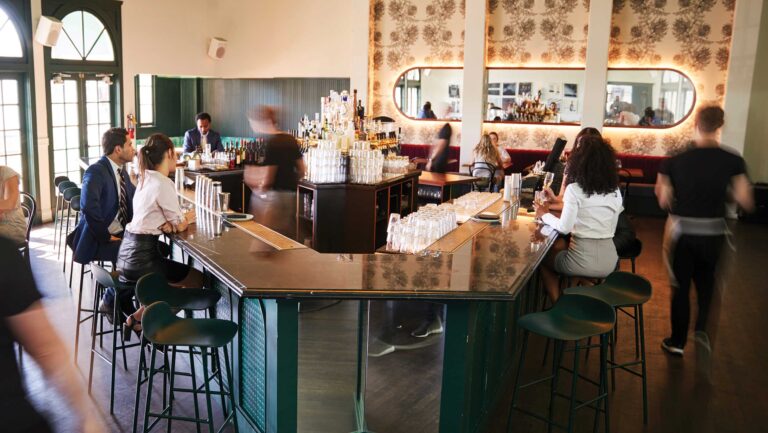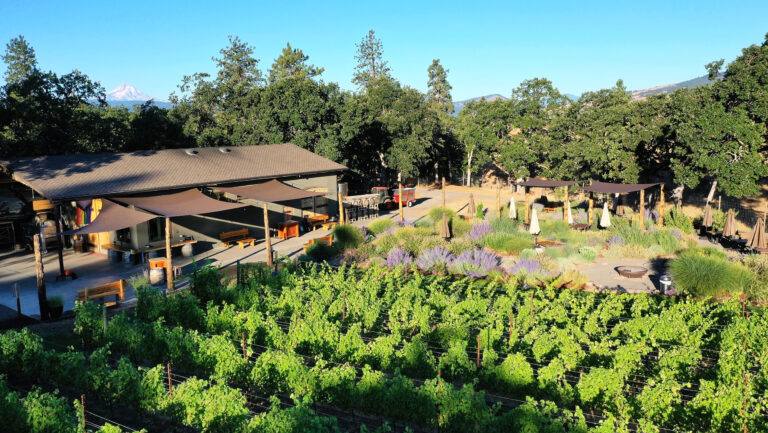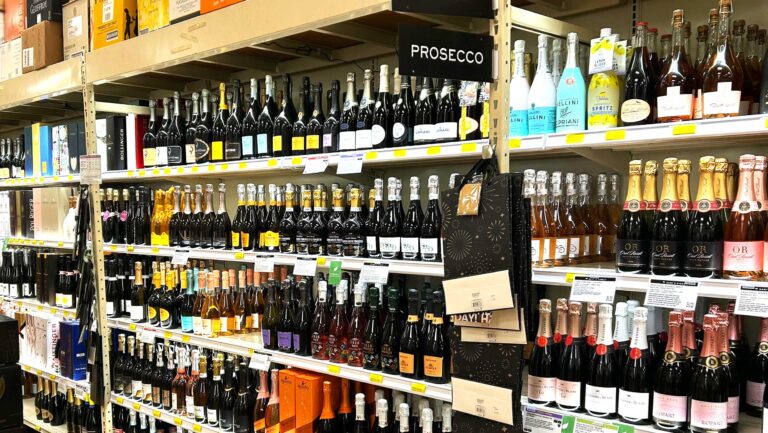On a September afternoon on Long Island’s North Fork, T.J. Ghant watched a EuroPress crush the grapes she had just harvested at Ev&Em Vineyards. “I kind of want to be a sommelier. This will help start that process,” she said. “I’m learning from seeing the back end.”
Ghant, who works at NoraeBar in Louisville, Kentucky, was one of seven bartenders who traveled from that city to this New York wine region as inaugural recipients of the Breanna Price Scholarship. An initiative from non-profit Another Round Another Rally, the scholarship is the brainchild of whiskey specialist Forrest Price and his sister Vanessa Price, managing partner of Ev&Em. Named for their sister Breanna, an award-winning mixologist who died in 2020, it provides bar pros two immersive weeks in winemaking.
With initial funding from Campari, Ketel One, and others, the program is designed, “so BIPOC recipients and women can see themselves in the future as a lead winemaker,” says Another Round Another Rally CEO Amanda Gunderson. Yet it is also shaped to bring the host winery “extra hands at a pivotal time in the season,” and to fill a gap in the hospitality needs of its recipients’ home city.

Don’t miss the latest drinks industry news and insights. Sign up for our award-winning newsletters and get insider intel, resources, and trends delivered to your inbox every week.
“I want to bring up the wine game in Louisville. There’s a glut of people who understand wine there, but there’s a thirst for it,” said Forrest Price. “The more people in our industry that get education, it’ll spread its tentacles and beautiful things will happen.”
Ghant was already planning her part. “Being an African-American woman and a part of the LGBTQ community, I’m taking this knowledge back and teaching,” she said. “I’m letting my community know, ‘Yo, people are starting to realize who we are. Now it’s our time to make sure we’re ready.’ We can box with your average white male who wins all the competitions because we have just as much knowledge, tools, creativity, and complexity.’ ”
All over the country, similar scenarios are playing out as drinks insiders galvanized by social justice movements face an industry wracked by post-shutdown staffing shortages and see opportunity for transformation through training. According to seasonally adjusted numbers from the Bureau of Labor Statistics, hotels, bars, and restaurants suffered a 10.2 percent staffing shortfall in August 2021—that’s 1.5 million unfilled positions. The attrition rate was 8.3 percent, the highest among industries. But 60 percent of job seekers won’t work in the field, citing low pay and lack of benefits.
Enter the new training programs. In an industry where training once came down to the first-night trail, they’re using innovative formats to impart everything from foundational skills to entrepreneurial expertise. Many aim to change the average hospitality job from a temporary gig to a vocation pursued by individuals who know their worth. With alumni bringing the confidence to seek proper compensation and upward mobility, this new wave of training could make hospitality a place people want to be.

Tech-Driven Training Tools
“The reason we have a labor crisis is we didn’t train or pay people correctly,” says Lindsey Johnson, the founder of Lush Life Productions, which runs Portland Cocktail Week. “If you train them, treat them with respect, work with them, they come to work.”
Johnson teamed up with No Us Without You, an L.A.-based food relief program for undocumented hospitality workers, to create virtual professional development classes for Spanish-speaking drinks pros. Training, she says, should be democratized. “It’s our responsibility as leaders to make sure the training is easy to access and has voices from different backgrounds, so there is resonance with folks.”
Johnson’s classes are free and archived online. Another solution, Opus, allows employers to deliver micro-courses via mobile. Ashley Christensen’s AC Restaurants and David Chang’s Fuku used it for anti-harassment training, while SPIN ping-pong club reopened eight locations by training staff with Opus.
“New hire training used to be a whole day with everyone in one room,” says Rachael Nemeth, the CEO of Opus. “But restaurants have to do more with less because managers are turning over quickly. How do you do it without breaking the bank? What if you don’t have a home office where you can gather?”
Automating and decentralizing training, Opus facilitates onboarding and cross-boarding—training new hires for positions they’ll grow into. “Helping people get up to speed and understand where they can go in the job could be the difference between them staying and leaving,” says Nemeth.
Smaller players can take a note from larger companies with solid track records in tech-driven training. Kerry-ann Johnson, the executive chef of Fleming’s Prime Steakhouse in Radnor, Pennsylvania, is a young Black woman who started at Fleming’s 10 years ago with no experience. With on-the-job training, she worked her way up. To enable such longevity and mobility, Fleming’s uses an extensive educational portal and onsite iPads connected to online learning.
“Our retention levels are high compared to the rest of the industry because of how we put our people first and invest in individual growth through our robust training programs that support their success from day one,” says Patrick English, Fleming’s VP of operations.

People-Centered Programs
Dana Darley, the director of development and partnerships at the dining club The Louisville Thoroughbred Society, is using what she learned in corporate hospitality to revolutionize the way that a standalone restaurant treats its workers. She previously worked for Marriott, where she had access to tech-based training and professional development opportunities. “I don’t have the funding Marriott has, but sometimes smaller is more effective because you’re there walking with these people rather than throwing information down the line,” she says.
Darley is helping her 33 staffers secure home loans, college enrollment assistance, and health insurance. “If they’re fulfilling their dreams, they will help with the goals of the establishment,” she says. For free, in-house training, she partnered with the Society of Wine Educators on a 14-week study group and spirits certification exam.
Newly promoted head bartender Michelle Cox says that training helped her move up quickly. “It was amazing because I learned so much. Without that education, you’re not making a connection to what you’re selling,” she says.
As Cox’s satisfaction indicates, training helps staff retention, which improves customer experience. “People here want to pick up hours,” says Darley. “When people want to be at their job, the customer always benefits.”
“The service industry can be a model for all sectors in terms of how you give people access.” – Touré Folkes, founder of Turning Tables
According to Kapri Robinson, the founder of Chocolate City’s Best in Washington, D.C., today’s training programs “are showing people this is a career, not just a job.” In addition to running the celebrated cocktail competition for BIPOC bartenders, Robinson is a mentor for New Orleans’ Turning Tables. “We’re allowing people to receive knowledge and putting them into internships beyond the first door, where they want to put you dishwashing and bar-backing.”
Founded by beverage industry veteran Touré Folkes, Turning Tables provides 12 weeks of immersion for new and emerging Black and brown drinks professionals, followed by a paid externship. He recently graduated his second class of seven. “Leadership positions in restaurants and bars generally go to white men or women,” says Folkes. “I was often overlooked for opportunities. Once I was given those, I just wanted people to skip that waiting period.”
Trainees receive ongoing support. “I had a student who was placed and having a hard time, so I had a discussion with the owner and manager. They realized they had failed him with training into that space,” says Folkes. “Part of the job of creating equitable spaces is having those conversations.”
With Turning Tables’ help, Jeri Guilford, a 33-year-old native of Jefferson Parish, Louisiana, passed his WSET 2 exam. Now he has two jobs, as a bartender at Anna’s and the bar manager at Seafood Sally’s. “I would have never thought I was going to be a bar manager,” he says. “I feel so empowered. I have goals for myself in life. I want to own my own business.”
Guilford sees his cohort as changing perceptions among those reluctant to hire them. “We are examples,” he says. “We are more than what you think or the news says we are.”
“Especially when it’s hard to find good help, having programs that are training people to be serious about what they’re doing is huge,” says Caitlin Carney, Guilford’s boss at Seafood Sally’s. “Everything Touré’s doing is important in changing the way the service industry operates.”
Such change might elevate hospitality to a beacon of best practices. “The service industry can be a model for all sectors in terms of how you give people access,” says Folkes. “People from tech and other industries have approached me to see how they can do something in their own fields.”

Getting New Personnel Up to Speed
For hospitality businesses hoping to hire locally, the only route to staffing may be through training. Restaurant consultant Beatrice Stein founded Hospitality Pathways following her experience of opening Minton’s Playhouse and The Cecil Steakhouse in Harlem. “There was a lot of desire but not the talent level we were looking for. I said, ‘Let’s hire for personality, and I’ll train them,’” she recalls. “That’s what we did to huge success. There are so many people who cannot break into our industry. They’re not listened to, not seen.”
Stein, whose program went non-profit in 2019, cross-boards aspirants referred from organizations serving disenfranchised populations, training them to a one-star level as hosts, runners, bussers, and servers. Then she helps place them; one trainee rose to management at a Union Square Hospitality Group property.
Solving the industry’s staffing crisis, she says, is in sync with creating solid futures for trainees. “Be on time, have a clean uniform, talk to guests, solve problems, work with a team—these are skills restaurateurs say they’re training people on the spot for. I give them staff who know expectations,” says Stein. “That way, they can move up faster because the goal is to get them out of entry-level jobs so they make more money, have better opportunities, and see that growth.”
When New York’s Rockaway Hotel launched, the owners had Stein design a six-week course for the community. “Rockaway Beach is an underemployed area,” says co-owner Terence Tubridy. “Hospitality is upward mobility. It’s a path to other industries. If you’re good at hospitality, you are good at anything.”
The program is popular; more than 40 signed up for the fall course. Of the 19 in the inaugural spring class, IGC Hospitality (which runs the Rockaway Hotel) hired four graduates and helped others with placement. Rashad Williams, who came with an associate’s degree in accounting but no hospitality experience, is now a night auditor at the Rockaway Hotel. “My friend is working at the front desk, and my brother works at the hotel as an engineer,” he says. “We talk about how we’ll open our own hotel someday.”
That kind of empowerment is priceless to an industry looking toward its future. “You have to invest in people,” says Tubridy.

Christopher Bates, the co-owner of F.L.X. Hospitality, is learning that the hard way. With an expansion across New York’s Finger Lakes region that took the company from three to nine properties during COVID, Bates has experienced a litany of problems from short staffing.
“Half our restaurants are running on limited hours. We haven’t been able to move from six-foot spacing or open more outdoor seating. We’ve had our flagship restaurant completed for a year but can’t open it. I’m working service every night, and so is my wife. Our beverage director is waiting tables. Everybody’s stretched,” he says.
To address the dilemma, he’s spent “an ungodly amount of money” on recruitment. But applicants have no experience. So Bates is expanding his commissary into a workforce training space and taking over an incubator kitchen with the goal of turning it into a community training center. In a region burgeoning from COVID flight from the city, Bates is “trying to create a prepared workforce for all of the hospitality that’s growing here in the Finger Lakes.”
Changing the Face of Production
As reflected by the Breanna Price Scholarship, there’s momentum, too, to train underrepresented individuals in wine, beer, and spirits production. The American Craft Spirits Association (ACSA) recently announced his first cohort for the STEPUP Foundation, the Spirits Training Entrepreneurship Program for Underrepresented Professionals. With an initial $1.2 million from Diageo, the program will matriculate candidates through three distilleries and a wholesaler. While learning all aspects of the spirits business with the help of vetted mentors, trainees receive transportation, lodging, and a stipend. “And we will help with job placement,” says ACSA president Margie Lehrman, “but that will be easy because candidates will have learned vastly more than anyone entering the industry.”
The goal is not only to “foster something positive” by diversifying distillery professionals, but to increase “the breadth of knowledge, experience, vitality, innovation, and comprehension in the industry,” says Lehrman. “We hope to have the industry be more reflective of the U.S. today, which includes our customers.”
“There are so many people who cannot break into our industry. They’re not listened to, not seen.” – Beatrice Stein, founder of Hospitality Pathways
Also this fall is the kick-off of Roger Apollon’s Entrepreneurship & Equity in Brewing. The owner of Orange, New Jersey’s Four City Brewing, Apollon is launching a 10-week crash course in brewing and entrepreneurship, followed by job placement help. Interns, if able, will contribute $500 to their education. “There’s got to be an investment from both sides,” says Apollon.
The aim is to create a pipeline to minority talent in brewing. “As a Black business owner, I understand why representation matters,” says Apollon. “You need people of color in positions of power to do something like this. Breweries want to diversify, but they don’t know a lot of Black people.”
Apollon’s vision is to replicate the program so every underrepresented city has its own brewery, staffed by locals. “Can you imagine the can art and beer styles? Can you imagine the collaborations, what the taproom would look like, the music, if you unleashed all that pent-up creativity and gave people a tangible?”

A similar mindset spurred Andrea Meriwether to create Farm Distilled, an entrepreneurship program funded with $25,000 from Angel’s Envy. “Combing through records about slave labor, I discovered women were involved in building the mashbills and mashing the grains,” says Meriwether, founder of the hospitality consultancy BarFare Concepts. With her program, she aims to educate women and bartenders of color about this underrecognized contribution, “so that it is infused into what they create after they leave.”
In its 2020 pilot year, bartenders studied historical practices, gardened a replica slave plot, and learned bitters making. For 2022, Meriwether is partnering with Louisville’s Black Soil farming cooperative on workshops in spirits and food production at Black-owned farms. “I want Black farmers to reap the financial impact of being a wholesaler to restaurants and bars, and that starts with knowing the bartenders,” she says.
Participants will create a product, such as a liqueur or food experience, in which they hold equity. “We over-train talent to be consumer-facing and never ask if they want to consider entrepreneurship,” says Meriwether. “I’ve been to a lot of education programming. I’m usually the only woman of color in the room, so I know what that disparity feels like.”
A program like Meriwether’s has potential for lasting impact. “It feels like the next generation will have something I didn’t have,” she says, “and that’s what’s important to me.”
That makes the effort worth it. “A lot of us don’t act out of fear of not making a difference,” says the Louisville Thoroughbred Society’s Darley. “But if I change one person who changes one person, that ripple effect is more effective than that grand net cast.”
The way they’re designed, today’s training programs just might change the face of industry leadership—especially if participants like T.J. Ghant have it their way. “A lot of people don’t have access, and the few that do are taking that back with us,” says Ghant. “We’re like, ‘You let me in the door now, and I’m busting the door open, so everybody can come with me.’”

Dispatch
Sign up for our award-winning newsletter
Don’t miss the latest drinks industry news and insights—delivered to your inbox every week.
Betsy Andrews is an award-winning journalist and poet. Her latest book is Crowded. Her writing can be found at betsyandrews.contently.com.







